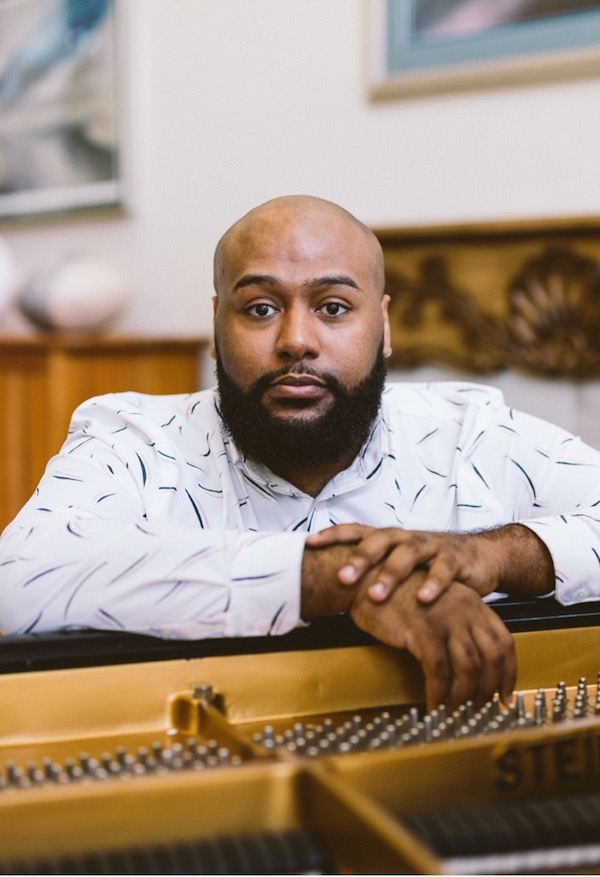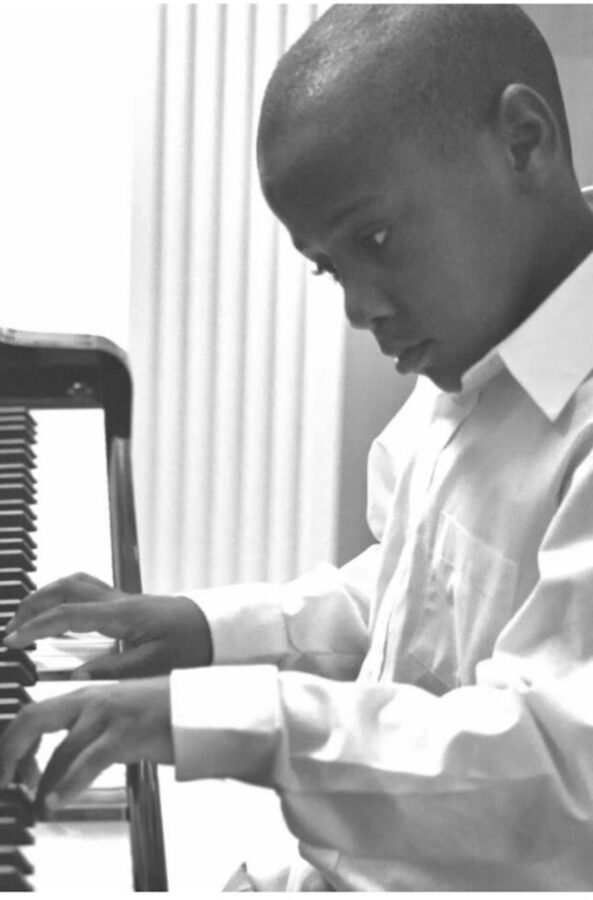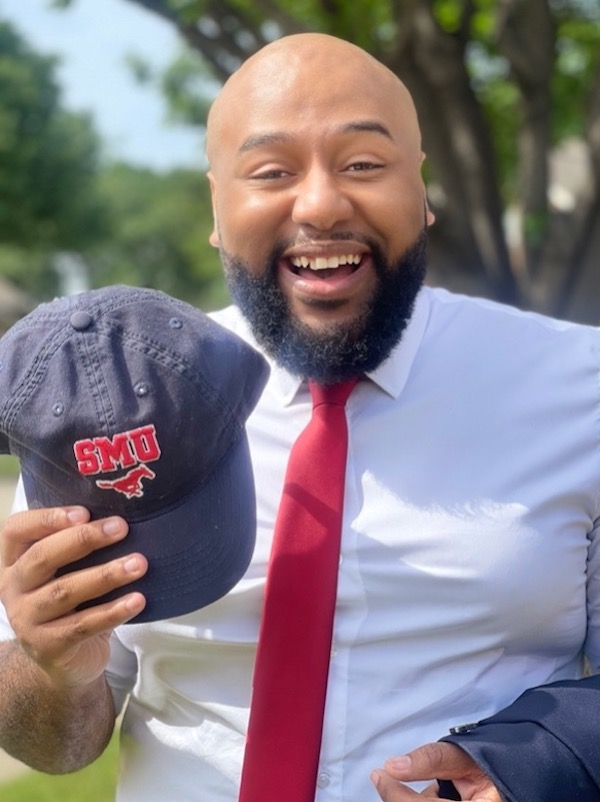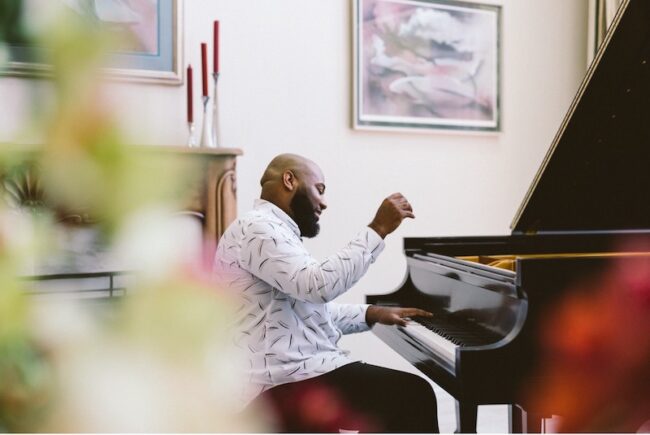Sitting quietly on the edge of the bench, eyes transfixed, Lewis Warren Jr. lifts his hands. As his graceful fingertips touch the ivory piano keys, rich tones pierce the silence of the room. The music is instrumental, and Warren, who has been playing by ear since age 3, lets the notes become expressions with power to nurture and heal.
“I want the world to know that music is a divine gift and should bring healing,” he said.
Warren is a master pianist, accomplished composer and improviser who already wowed classical music and TV audiences before arriving at SMU to study performance. He believes the greatest innovation is human connection. His ability to connect with others is the genius behind this artist as he paints a portrait of culture through his music.

Warren first touched the keys of a piano when a kind friend gave his family an upright piano. The 3-year-old soon realized the tones on the television could be played on the piano. His parents were amazed at his uncanny ability to play by ear and harmonize notes with both hands. They searched for teachers to work with him, but many thought he was too young and those who worked with him realized he could copy anything by ear. At age 5, when his grandmother had a stroke, Warren composed his first song which he insightfully called “Eternity.”
“Even as a kid, I was always hopeful,” he said. “I think a lot of people lose hope. I hope when they hear me play, they find hope.”

When Warren was seven, he began taking piano lessons, but his teacher, Elena Tsvetkova wouldn’t play anything for months because of his ability to copy anything he heard. In six months, with her insistence and intense training he mastered reading musical notes and gained a solid musical foundation. He discovered his passion for classical music and a year later, Warren performed his first recital in Cancun, Mexico.
Warren soon took his talent to the world stage and auditioned for America’s Got Talent. With only a 30-second time slot, was invited to the live rounds. In front of the judges Pierce Morgan, Sharon Osborn and David Hasselhoff, Warren played his own arrangement of “The Prayer” by Celine Dion that he had arranged at age 8. Although Warren didn’t win, he learned how to present himself as an artist.
It also prepared him for playing larger venues. At the 2009 NASCAR Texas Motor Speedway, Warren performed his own arrangement of the national anthem for over 200,000 attendees.
When Warren was 10 years old, he continued studying piano with Southern Methodist University Meadows School of the Arts Professor and Chair of Piano Studies, Carol Leone, until his freshman year in high school. Through Leone, Warren played with the Dallas Symphony Orchestra and won its 2011 Lynn Harrell Concerto Competition. He was also a grand prizewinner in both the Dallas Symphonic Festival and McKinney Young Artist Competition, and a first-place winner in the TMTA 9-10 Concerto Performance Contest.
“He possesses an extraordinary talent and is a very special human being,” Leone said. “His many gifts and his warm personality bring constant joy and inspiration to me, to my studio class, and to the entire department of piano studies. In particular his uncanny ability to improvise entire compositions on the spot is absolutely unsurpassed, in my experience.”
Once again Warren is studying Leone while pursuing a performer’s diploma. He credits her generous, caring, and challenging spirit for helping help him grow as an artist. He refers to Leone as his cheerleader and “musical mother.”
With his ability to play by ear, solid musical foundation, composition skills and classical training, Warren has become a renowned improviser. In a 2012 TEDx SMU Vision event, the 15-year-old amazed the audience when he was given five notes by a member of the audience who suggested the genre: Polka. He wowed the crowd.
Warren compared improvisation to cooking. He said it’s when you have all the ingredients and decide how much of them to add. Warren explained every note has some type of harmonic function that leads to other tonalities. To him, it is sort of like a mathematical equation where 1 + 1 = 2. With the notes, he can choose the key, the rhythm. This creativity and ability to transform emotions through music is where Warren excels.
“I always try to create a space that is comforting, safe, explorative and connecting,” Warren said.
“As an improviser, I want to create a sense of awe, warmth and curiosity.”
One of Warren’s greatest honors was playing with Harvey Lavan “Van” Cliburn, who was famous for winning Moscow’s first Tchaikovsky Competition during the Cold War between Russia and the United States. The new American artistic pride opened possibilities for cross-border cultural relations and proved music had the ability to heal. At the Van Cliburn 50th Anniversary Gala, 15-year-old Warren performed for 840 guests at the Fort Worth Convention Center. Warren was touched by a special moment being hugged by Van Cliburn, a 6-foot-tall man with large hands who exuded kindness.
Warren was homeschooled most of his life, except for a couple of years attending a charter school in Arlington, Texas, where the academic load prevented him from practicing piano. He decided to focus on his music, returned to homeschooling and prepared to audition at top music conservatories for undergraduate study. After auditioning and being accepted and granted scholarships at five elite conservatories, he chose to attend the New England Conservatory of Boston (NEC). Warren was amazed at the professionalism of his fellow students and the city’s arts and culture. He enjoyed this formative time in Boston, where his musical wisdom matured, and he grew as an artist.
He was ho asked to compose a piece for the 80th birthday and farewell of prominent master pianist Victor Rosenbaum after his five decades with NEC. This world premiere performance of Warren featured his composition Ballade II: Dreamscapes of Autumn, inspired by images of autumn, when leaves fall, rustle, and the sadness at of the end of the era of a distinguished faculty member.
In 2020, Lewis performed for the TED 2020 Vision to celebrate the 250th anniversary of Ludwig Van Beethoven. Warren said he was inspired by the way Beethoven was able to structurally emote by breaking the barriers of classical training and becoming the bridge between classical and romantic composers. He quoted Beethoven saying, “Music is a higher revelation than all wisdom and philosophy. Music is the electrical soil in which the spirit lives, thinks and invents.”
Warren also spoke of the importance of human connection, but little did he know the world would shut down because of COVID-19. With lockdowns in place, Warren, like others, connected to his audience virtually.
He played he played his arrangements of hymns and worship songs on “Faith Filled Fridays” and on “Music Mode Monday,” he played various music from arrangements of Disney favorites to musical arrangements of current artists.
“Music connects people through life experiences music brings the world together, music is a human connection point, music is spiritual,” Warren said.
Warren said he never tires of playing Chopin or Rachmaninoff, masters of long phrases, rich harmonies with a sense of melancholy and sweeping melodies. He enjoys listening to listens to pieces for different reasons. To him, the Mozart piano concertos are comforting and joyful.
He also enjoys listening to all genres, pop, jazz, K-pop, and Indie. He likes Kelly Clackson, the Queen B, Cole Porter, and Ella Fitzgerald and loves Henry Mancini. He believes the experience with different styles of music helps with improvisation and gives him a whole different connection point to others.
Although Lewis has spent his life perfecting his craft, practicing six hours per day, he is humble, and credits others who have supported him along his journey, his mother, father, brothers and friends. He calls them his “angels.”
Warren is inspired by his faith in God. Before beginning to play, he sits quietly as if in a trance.
“I love to listen to music worship music to get into the zone, to pray or center myself,” Warren said. “Typically, I pray and ask that God will use me for his glory. My musical talent is definitely a gift that was given to me.”
Warren’s accolades keep stacking up. Earlier this year, he won the first-ever Ebony Prize for the best performance of a composition by a Black composer held at the annual Music Teachers National Association (MTNA) conference in Reno, Nevada. He also won first prize in the Young Artist Competition held at the conference.
This weekend he’ll premiere is own composition, Ballade II: Spring’s Insurrection. The performance on Sunday, April 30, Warren will play works by Beethoven, Chopin, Faure’s 2nd violin sonata with violinist director of chamber music and professor of practice in violin in the Division of Music at SMU Meadows School of the Arts Professor Aaron Boyd.
Although Warren is a master pianist, composer and frequent top prizewinner in local, state and international piano competitions, he is a a master at connecting with others, not only through his music but with his kind heart, his strong faith, and humble manner. His impact on the lives of others is a powerful reminder of the bold expression in the power of music.
“Connecting with music, connecting with people, those are the things I am very passionate about,” Warren said. “The greatest gift is life and faith and love. Being able to share that through music – that inspires me.”






















